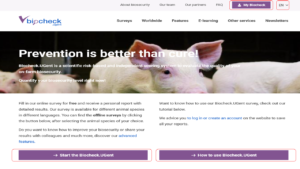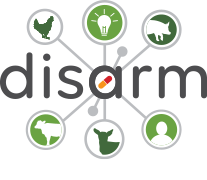Assessing Biosecurity with Biocheck
Biosecurity measures help to prevent the entry and spread of infectious diseases on farms. Good biosecurity can help improve animal health and productivity and prevent costly disease outbreaks on farms. As such, biosecurity is the basis for disease prevention on farms. Still it can be a matter of subjective judgement whether measures taken are sufficient or need extra effort. In the past, this subjective evaluation also made it hard for setting concrete targets and monitoring improvement in biosecurity measures. Luckily, this problem has been solved with the arrival of Biocheck, an objective and risk based scoring system to assess biosecurity on pig, broiler, layer, veal, dairy and beef farms. The systems is based on cutting edge scientific research and developed by the faculty of veterinary medicine of Ghent University.
This biosecurity scoring system takes into account the 5 general principles of biosecurity:
- Separation of infected and susceptible animals by avoiding any direct and indirect contact between them
This means taking adequate and consistent measures to prevent transferring pathogens from infected animals to healthy susceptible ones
Think of installing a good quarantine protocol before entering purchased animals to your herd, optimize working lines and changing clothwear and shoeing and other measures to compartmentalize groups of animals on the farm. - Not every transmission route of pathogens is equally important.
The biocheck scoring system takes into account a gradation in importance of different pathways animal can become infected with pathogens. For example, measures that prevent direct contact between susceptible and infectious animals are much more important than measures that prevent potential transmission of pathogens through animal feed or breath of persons in the stable. Questions in the Biocheck, referring to these different transmission pathways have been attributed proper weights for the final score based on scientific research. - Reduction of the general infection pressure
Sterile production facilities are impossible to achieve, luckily however, animals’ immune system can cope with some degree of infection pressure. Biosecurity measures therefore should target to achieve a general reduced burden on the animals natural defence systems to let them thrive. Measures to think of are: thorough cleaning and disinfection of facilities and adequate down time of stables or vaccination. - Size matters
With increasing farm size, risks for disease entering the farm increase as well as the detrimental effects of a disease outbreak. It does not mean that small farms should not pay attention to biosecurity, but the negative impact on large farms will just be bigger. - Frequency matters
Related to the previous principle, an event with a rather small chance of transmitting disease into your farm or between the animals on the farm can cumulate into a considerable risk if the event gets repeated often enough. For example the chance that a single external visitor or a sigle feed delivery truck is the transmitter of disease might be small but if your farm receives external visitors or feed on a weekly basis this chance can cumulate into a considerable risk for disease entering your farm. Therefore, Biocheck will assess measures to prevent for examples visitors or feed trucks to infect your animals and will take into account the frequency of these events.
Advantages of Biocheck
- Biocheck assesses the farm’s biosecurity in general and not only for one specific disease.
- Your farm gets an overall score for its biosecurity level as well as more detailed score for both external and internal biosecurity. Moreover more detailed scores for the aspects that make up the score for internal and external biosecurity are presented as well. Within a blink of an eye you can identify the aspects of the farm that can be improved for better biosecurity.
- The basic version: scoring list and links to additional info on biosecurity is free of charge.
- It is ideal for benchmarking. The Biocheck score sheet provides a comparison for your farm with those of colleague farmers in your country and worldwide. Moreover, under the expert license (not for free) you have additional options to design your own benchmark, visualize progress over time and access e-learnings to improve biosecurity further.
- It is available for all pig farms: farrowing, farrow-to-finish or finishing pig farms, poultry farms: broilers and layers, dairy and beef and veal farms.
How to use Biocheck
The use of biocheck was explained by prof. Jeroen Dewulf in the webinar: Principles of Biosecurity and use of Biocheck
From minutes 10:55 onwards the use of Biocheck is being explained.
To use the free version of Biocheck go to: www.biocheck.ugent.be
In the right top corner you can set the language to English, Dutch, French, Spanish or Chinese.
It is advisory to register your profile by clicking on the My Biocheck button. This way you will be able to save all your reports and look them up later.
Detailed instructions for the website can be found with button instructions in the right lower corner.
To start the assessment click on “Start the Biocheck.ugent”
Pick your the survey for the type of farm you want to evaluate.
It is advisory to print a printable version of the survey and take it with you along a tour over the farm.
The routines you will follow to enter the farm, (registration, change of clothes and shoeing, showering, walking lines, etc. will already provide you with answers to several questions in the survey.
After the farm tour you can take the paper survey to your office and complete the survey online to obtain the scoring sheet.

minutes 10:55 in webinar
Go to www.biocheck.ugent.be
